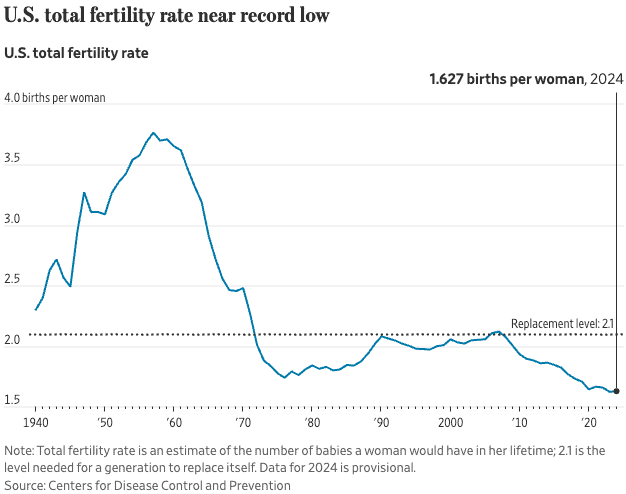The U.S. fertility rate fell to its lowest on record in 2024 with fewer than 1.6 children being born per woman. The new number reflects the continuation of a years-long decline in the fertility rate raising concerns for our nation’s economic and societal future.
According to new data released by the Centers for Disease Control and Prevention (CDC), there were 3,628,934 births in the United States in 2024, an increase of 1% from 2023. However, the general fertility rate (number of births per 1,000 females ages 15-44) declined 1% to 53.8 in 2024 from 54.5 in 2023.
In 2023, the U.S. fertility rate was 1.621 births per woman, but fell to just 1.599 in 2024.
The 2024 number was revised downward from provisional data released earlier this year, which had shown a slight uptick into the fertility rate to around 1.63 births per woman.
The replacement rate is generally 2.1 births per woman, though some studies show that number may be lower in more developed countries.

Photo Credit: The Wall Street Journal. Please note, the chart displays the CDC’s provisional 2024 data and has since been revised downward.
Some researchers have tried to quiet alarm about the ongoing decline in the fertility rate.
“We’re seeing this as part of an ongoing process of fertility delay,” said Leslie Root, a researcher focused on fertility and population policy at the University of Colorado Boulder. “We know that the U.S. population is still growing, and we still have a natural increase – more births than deaths.”
But here’s an important factor Root failed to mention: That’s unlikely to last for very long. As women choose to delay having children, they become less likely to ever have children. And if they do, they’re likely to have fewer children than they otherwise would have.
Half of women of who married in their early 20s have at least three children, while only 33% of women who get married after 30 do so.
It’s no surprise that as marriage rates have declined, and as there’s been a corresponding increase in the average age of first marriage, the fertility rate has declined too.
As two scholars at the Institute for Family Studies write, “Delays in marriage until later in life do not simply reduce the number of years available for (marital) childbearing. They may make it more difficult to conceive in the first place.”
Dr. Brad Wilcox, Professor of Sociology and Director of the National Marriage Project at the University of Virginia, commented on the CDC’s new report in an interview with the Catholic News Agency, stating, “This is a pretty marked decline that we’ve been seeing unfolding here in the United States.”
“It’s partly a consequence of the fact that we’re also seeing in recent decades a decline in marriage,” he added, “which is one of the most important drivers of declining fertility in the U.S.”
Considering the year-over-year decline in fertility, there’s no indication the U.S.’s falling fertility rate will level off anytime soon.
According to researchers Darrell Bricker and John Ibbitson, author of the book Empty Planet,
Among millennials, especially, the fertility rate is very low. Between 2007 and 2012, the birth rate among Americans who came of age after 2000 dropped by 15 percent, to the lowest birth rate ever recorded in the United States: 0.95, less than one baby for every mother.
“Millennial American women have, in the main, opted not to have children in their twenties,” they add. “This means that these women, when they do have children, will have fewer children than they would have had otherwise, which means the generation produced by the millennials will be smaller than the millennial generation itself.”
Looking forward, the shrinking size of following generations is unlikely to end anytime soon.
This reality is why it’s important for Christians to speak important, counterculture truths like:
- Most men and women have a God-given vocation to marriage.
- Getting married young (in the early to mid 20s) and then having children is, generally, preferable for most people.
- Children are a blessing from the Lord.
- We are facing an underpopulation problem, not an overpopulation one.
- Most adults should prioritize their faith and family formation, over their career development or friendships – the exact opposite of what so many do.
It would be good for young people today to remember God’s first command to humanity: “Be fruitful and multiply” (Gen. 1:28, ESV).
This is especially true in our age of declining fertility, marriage rates and family formation.
As a pro-family ministry, Focus on the Family recognizes the tremendous value of every person, every child and every marriage. To strengthen your family, check out our marriage and parenting resources.
You can also check out Focus on the Family’s Option Ultrasound program here.
Related articles and resources:
Get Married: Why Americans Must Defy the Elites, Forge Strong Families, and Save Civilization
Brad Wilcox: The Correlation Between Marriage, Happiness, and Wealth
The Importance of God’s Design for Marriage and Family
New Report Gives Update on Family Formation and Child Well-Being
Global Population Has Passed ‘Peak Child’ – an Ominous Milestone
Death of the West? U.S. Fertility Rate Falls to Record Low.
China’s Population Drops by 2 Million in 2023 Due to Record Low Birth Rate
Discarding Genesis 1, U.S. Population Set to Decline This Century Amid World Population Collapse
Photo from Shutterstock.










